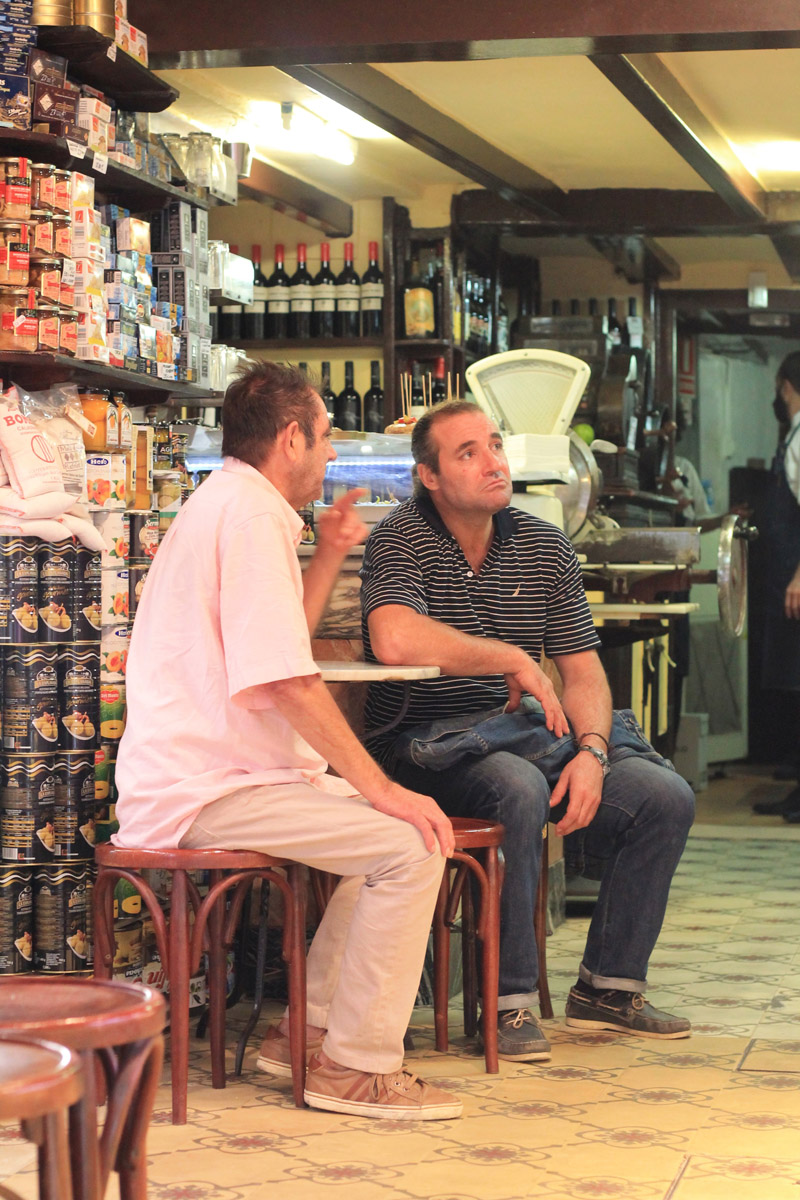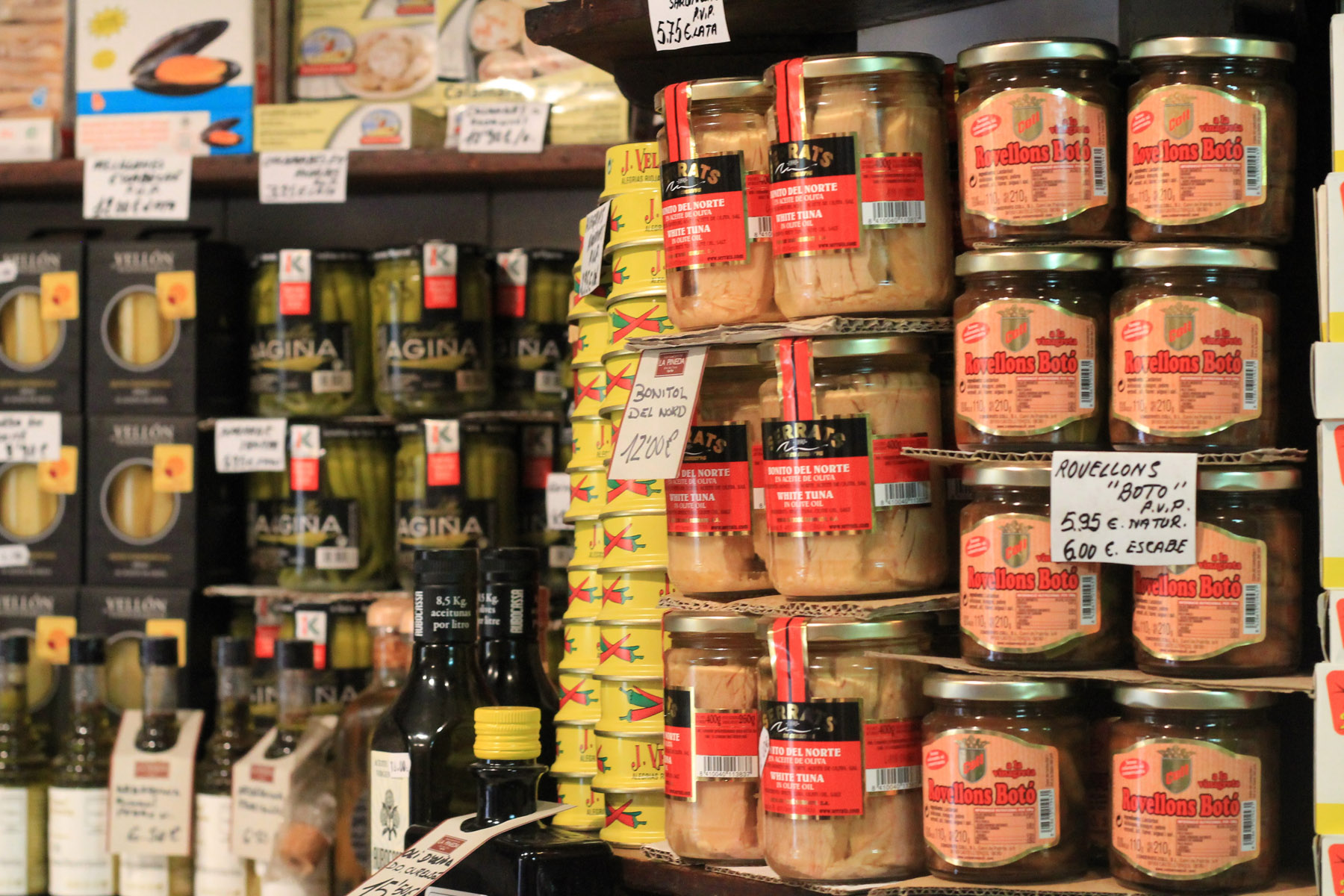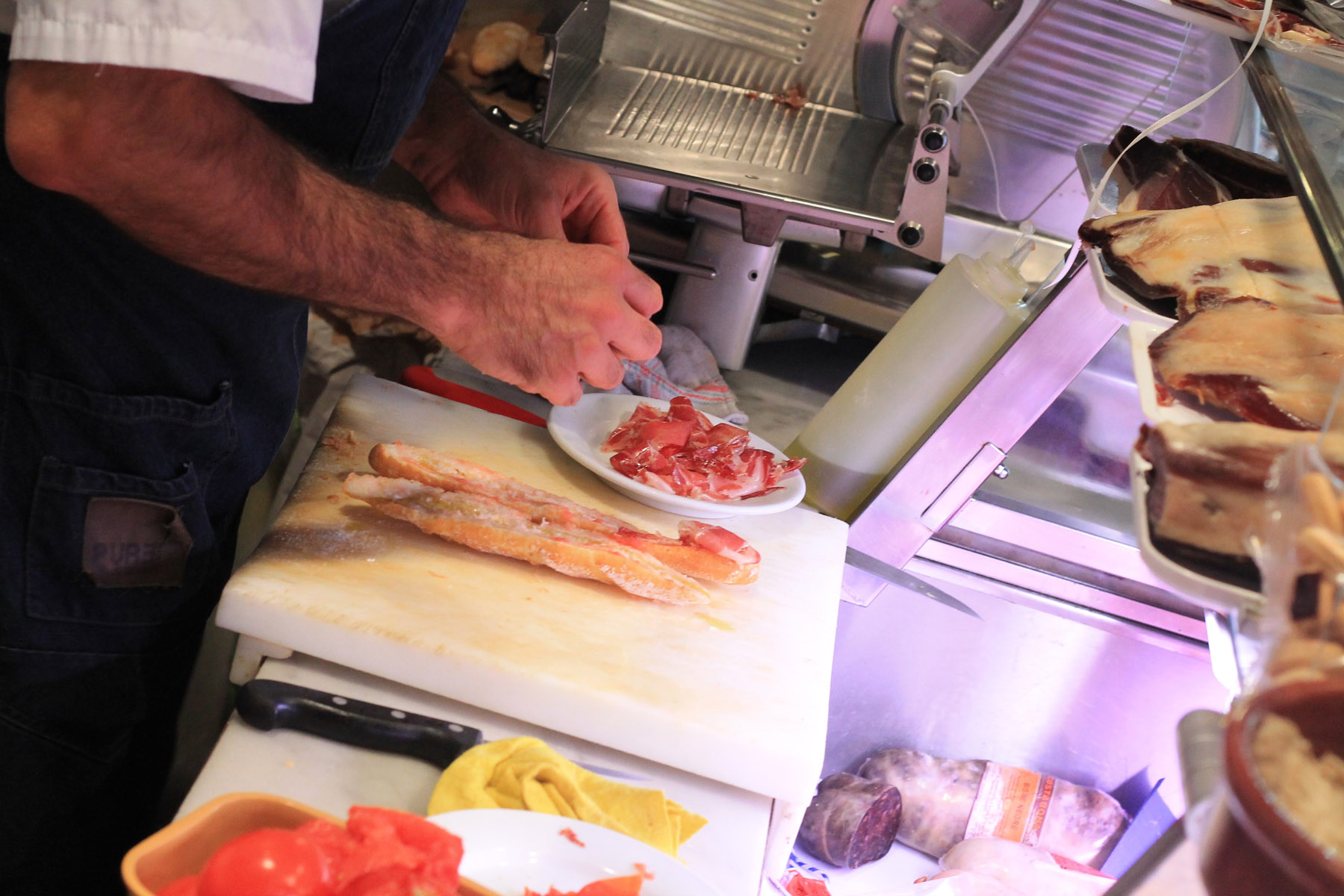Few places in the world share the vibrant eating and drinking culture found in Barcelona. Tapas, the city’s world famous small plates that teem with big flavour, are on display at every turn there. Their compositions are a celebration of Spain’s vast array of regional foodstuffs, including jamón ibérico, chorizo, berberechos, navajas, langostillos, and pan con tomate, as well as anchovies, olives, cheese, and sardines. The list is longer than La Rambla, and these foods can be washed down with a number of domestic wines like albariño, macabeo, rioja, monastrell, and garnacha. You can find all this, and some of Spain’s most obscure delicacies, at La Pineda, an 86-year-old butcher shop in Barcelona’s Gothic Quarter.

Red (vermella) llonganissa, a thin pork sausage from the southeastern city of Murcia that’s flavored and colored with copious amounts of paprika. All photos by the author. Two guests and friends get comfortable before sharing a round of afternoon drinks at La Pineda.
Two guests and friends get comfortable before sharing a round of afternoon drinks at La Pineda.
La Pineda smells like salt. Two-dozen varieties of cured meats—sourced from all over Spain—hang from butcher’s twine looped around hooks on cast iron rails that run along an arched and tiled ceiling. Below it, a display case holds cheese and cured meats that are turned into sandwiches throughout the day. A silver cooler across from this is full of white wine and foie gras and more cheese. Above it, stacks of small boxes and tins and jars tower toward the ceiling, where bota bags and a dozen jamón legs protrude like stalactites. The former are wrapped in plastic to protect their leather lining. The latter are exposed to the air so they may continue to cure, and they slowly drip grease into upside-down white plastic triangles as they do.
Videos by VICE

A leg of jamón that gets sliced to order is covered by fat cap that’s kept in place to keep the top of the ham from drying out. Alex Segovia pours wine for guests at Pineda’s front table.
Alex Segovia pours wine for guests at Pineda’s front table.

An old vermouth barrel on display with old bottles of booze the owners have collected throughout the decades.
With the front door open, a breeze comes in off Carrer del Pi. The sun, at high noon, reflects off the street’s cobblestones and throws light and warmth into an otherwise dark and cool xarcuteria that’s been run by the same family since 1930.

Servers Alex Segovia, Alessandra Aruguete, and Leo Vinitzki behind the counter. Canned white tuna from Serrats, a 126-year-old company from Bermeo in northern Spain next to jars of mushrooms preserved in a vinaigrette from Conservas Coll, a 121-year-old company from 50 kilometers north of Barcelona.
Canned white tuna from Serrats, a 126-year-old company from Bermeo in northern Spain next to jars of mushrooms preserved in a vinaigrette from Conservas Coll, a 121-year-old company from 50 kilometers north of Barcelona.

Leo holds an apple that was the subject of a long conversation with one of Pineda’s guests—a baker—who argued the merits of the particular apple’s sugar and moisture content and how it’s the best apple for baking tartas de manzana (apple tarts).
The store’s 350 square feet are the best place in Barcelona to rub elbows with some of Spain’s oldest and most ubiquitous culinary traditions (and spirited characters). The decades-old store maintains a timeless sense of hospitality and the employees exude grace. Servers Alex Segovia, Alessandra Aruguete, and Leo Vinitzki are eager, and quick, to attend to the clientele, and the service shines as bright as the quality of provisions. Go once and you’re a regular.

A tin of mejillones en escabeche—pickled mussles—open and displayed for service. Vinitzki preps a jamón bocadillo, the classic Spanish ham sandwich served on a crusty baguette.
Vinitzki preps a jamón bocadillo, the classic Spanish ham sandwich served on a crusty baguette.

Vinitzki at work behind the counter.
These provisions come in many guises: fresh, canned, jarred, brined, pickled, cured, and aged, to name but a few. La Pineda’s near-centennial age aside, the shop is known for having a diverse selection of hard-to-get products from all over Spain. There is torteta (blood sausage from pork mixed with butter, flour, and breadcrumbs) and chireta (organ sausage made in sheep intestines that have been turned inside out) from Aragon; morcon (like chorizo, but wider and aged longer) from Murcia; and a uniquely pungent cheese called Mahón from the Spanish island of Minorca.

Vinitzki pours wine (albariño and garnacha) for guests to stand and enjoy before going about the rest of their day. La Pineda’s vermouth label.
La Pineda’s vermouth label.
You can find wine, spirits, beer, and cava at La Pineda, and the shop produces its own vermouth, the bottles for which get filled from a spigot attached to an old barrel on a chest-high shelf at a slight lean in the back of the store. The spigot opens often.

La Pineda’s small and narrow sun-kissed storefront.
La Pineda is a portal where Barcelona may go to escape. It’s a world of possibility and vibrant flavours entered through an old, lacklustre storefront. There are only five tables at La Pineda, but if you’re lucky enough to get one, you’ll embark on a tour of Spain from the comforts of a small wooden stool.
More
From VICE
-

Illustration by Reesa -

Screenshot: ROH -

WWE -

Screenshots: Facebook/Jon St John, Sega